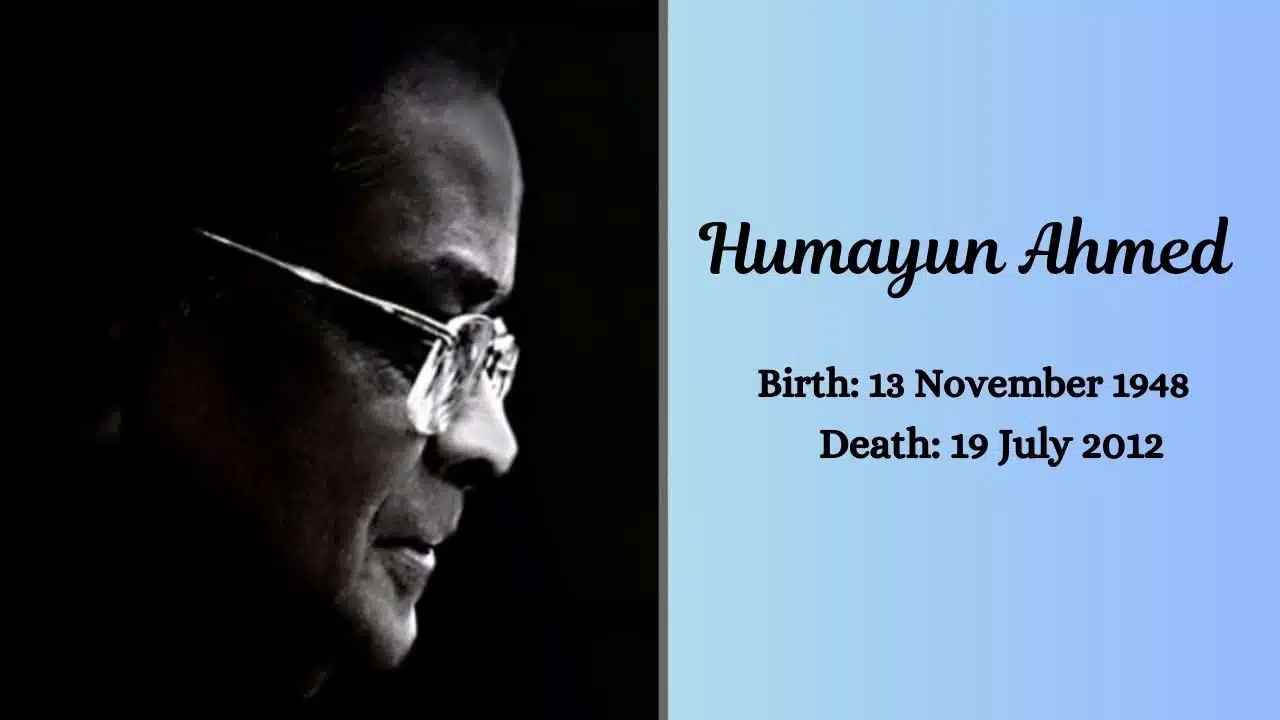In the vast world of literature and film, it’s easy to feel overwhelmed by the sheer amount of talent that has graced our lives. Yet, some storytellers leave a mark so deep that their absence is felt years after they’ve gone.
One such luminary is Humayun Ahmed, whose stories have touched hearts across generations. As we approach his 11th death anniversary, many fans and admirers find themselves looking for ways to honor his legacy and reflect on his contributions.
Humayun Ahmed was not just any writer or filmmaker; he was a force behind revolutionary changes in Bangladeshi culture through his screenplays, novels, and films. On July 19, 2012, the world lost this iconic figure to colorectal cancer at Bellevue Hospital in New York.
This article aims to guide you through a journey of remembrance and celebration of Humayun Ahmed’s life and works. From Nuhash Palli to Dhaka University, from “Nondito Noroke” to “Ghetuputra Komola,” you’ll learn how he shaped modern Bengali literature and film.
Join us as we pay tribute to a master storyteller.
Exploring Humayun Ahmed’s Legacy
Humayun Ahmed’s Legacy:
Delve into the enduring impact of Humayun Ahmed’s literary and film contributions
Elevate your understanding of his transformative influence on Bangladeshi literature and cinema.
Celebrating His Works and Contributions
Humayun Ahmed brought stories to life in a way that captured the hearts of millions. His novels, like “Kothao Keu Nei” and “Shonkhonil Karagar,” became classics of Bangladeshi literature.
He didn’t just write books; he turned them into films and TV shows that people loved. For example, “Aguner Poroshmoni” not only won the Bangladesh National Film Awards but also showed his talent for directing movies with deep messages about love and war.
His plays on Bangladesh Television, especially “Aaj Robibar,” made families gather around their TVs with laughter and joy. Ahmed received awards like the Bangla Academy Award and Ekushey Padak, showing how much his country valued his work.
I remember sitting down to watch “Baker Bhai” in “Kothao Keu Nei,” feeling thrilled every time it came on. It was clear that Humayun Ahmed knew how to touch our lives deeply.
Words have power, and Humayun Ahmed wielded them beautifully to tell stories that felt real and close to our hearts.
His Impact on Bangladeshi Literature and Film
Humayun Ahmed changed Bangladeshi literature and movies like no one else. His stories brought new life to the pages of books and screens, making readers and viewers feel a mix of joy, sadness, and wonder.
He crafted characters that felt like real people, such as Himu in “Himu Paribahan” and Misir Ali in “Nokkhotrer Raat.” These figures walked off the page into the hearts of millions.
Ahmed’s knack for storytelling wasn’t just about fiction. He also won awards like the Michael Madhusudan Padak and the Bachsas Award for his work in film. His movie “Daruchini Dwip” is still loved by many for its beautiful narrative.
Ahmed’s influence reached far beyond just entertainment; he shaped how stories are told in Bangladesh. Through his writing, he showed that everyday life could be magical and that every person has a story worth telling.
This approach inspired a whole generation of writers and filmmakers to see their world differently. Directors now aim to capture life’s simple moments with the same magic Humayun Ahmed did.
Writers try to create characters as relatable as those in his stories. Awards named after him, like the Lekhak Shibir Award, encourage young talent to follow in his footsteps.
Commemorating the 11th Death Anniversary
On this 11th Death Anniversary, we honor Humayun Ahmed’s memory and reflect on his enduring impact. Special prayers and tributes are observed in remembrance of the date and cause of his passing.
It is a time to commemorate his legacy and pay homage to his profound influence on Bangladeshi literature and film.
Remembering the Date and Cause of His Passing
Humayun Ahmed, a towering figure in Bangla literature and cinema, left us on July 19, 2012. His battle with colon cancer ended at Bellevue Hospital in New York. This day marked the loss of an iconic storyteller whose works continue to enchant millions.
His stories were a bridge for many of us to our roots and dreams.
On that somber day, followers across the globe felt a void that was once filled with his magical words and unforgettable characters. As his family held special prayers and programs like Quran khatam back home at Nuhash Palli, Gazipur—a haven Ahmed built out of his love for nature—his fans took to social media platforms to pay their respects.
Personal anecdotes shared by those close to him including Meher Afroz Shaon, his wife, painted a picture of a man whose legacy transcends time and space.
National Observations and Commemorations
On this 11th anniversary of Humayun Ahmed’s passing, national observations and commemorations are taking place to honor his enduring legacy. Here are the key events and activities that mark this important day:
- Shishu Academy Award for Literature is being presented in recognition of Humayun Ahmed’s significant contributions to Bangladeshi literature.
- The web is flooded with social media tributes, reflecting the impact of his work on a global scale.
- Bellevue Hospital in New York, where he passed away on July 19, 2012, has become a site for fans to pay their respects and remember his influence.
- Asaduzzaman Noor, a close friend and colleague of Humayun Ahmed, is leading a commemorative event at North Dakota State University to celebrate his life and works.
- The Bangladesh National Museum is hosting an exhibition showcasing memorabilia from his literary and film career.
- A special screening of “Shyamol Chhaya,” one of his iconic films, is being held as part of the tributes across the country.
These observances serve as poignant reminders of Humayun Ahmed’s lasting impact on Bangladeshi literature and film, ensuring that his memory endures for generations to come.
Tributes to Humayun Ahmed
Fans and colleagues fondly remember the lasting impact of Humayun Ahmed. His creativity leaves a profound legacy in Bangladeshi literature and film.
Remembrances from Fans and Colleagues
Fans and colleagues continue to honor Humayun Ahmed by sharing their heartfelt tributes and memories. Their testimonials reflect his profound impact on Bengali literature, film, and culture.
Many remember him as a visionary storyteller who captivated audiences with his unique narrative style and engaging characters. Colleagues speak of his mentorship and support, highlighting how he inspired a new generation of writers and filmmakers.
Fans fondly recall the emotional resonance of his works, which continue to resonate with readers globally.
The outpouring of affection from fans and colleagues underscores the enduring legacy that Humayun Ahmed has left behind. His contributions have paved the way for countless creators in the realm of Bangladeshi literature and film, ensuring that his influence remains an integral part of contemporary cultural discourse.
Whether through poignant remembrances or insightful reflections, it’s evident that Ahmed’s impact will continue to shape the literary landscape for years to come.
The Enduring Legacy of His Creativity
Humayun Ahmed’s creativity continues to influence modern Bengali literature and film. His iconic characters, such as Himu and Misir Ali, remain beloved by readers even today, showcasing the enduring impact of his storytelling.
His works have been adapted into successful films and television series that captivate audiences, demonstrating his lasting influence on Bangladeshi film.
Furthermore, Humayun Ahmed’s writing style has shaped a generation of writers in the realm of Bengali literature. His ability to craft compelling narratives with relatable characters and thought-provoking themes underpins his significance as a transformative figure in the literary landscape.
Moreover, he elevated Bangladeshi literature by encompassing diverse elements of human emotions and societal observations in his work.
Debating His Literary Journey
Readers debate Humayun Ahmed’s literary journey, analyzing his writing style and the impact of controversial themes. Critics discuss the influence of his work on modern Bengali literature and its effect on contemporary writers and filmmakers.
Critiques of His Writing Style
Some critics question Humayun Ahmed’s writing style, finding it too simplistic for literary merit. They argue that his focus on everyday characters and mundane situations lacks the depth and complexity expected in serious literature.
Despite this, many readers find his straightforward narratives relatable and engaging.
Additionally, some literary experts believe that Humayun Ahmed’s frequent use of colloquial language may have limited his appeal to a more global audience. They suggest that a broader vocabulary and more sophisticated prose could have elevated his work to international acclaim.
However, it cannot be denied that these very elements are what endeared him to the Bangladeshi people, making his stories accessible and resonant to them.
Discussion of Controversial Themes
Humayun Ahmed’s literary journey sparked debates about his portrayal of controversial themes in Bengali literature. Critics scrutinized the boldness of his storytelling and its impact on societal norms.
His novels and scripts often depicted complex human emotions, challenging traditional customs while captivating audiences with their raw honesty. This led to thought-provoking discussions surrounding cultural taboos, social hierarchies, and moral dilemmas prevalent in contemporary Bangladeshi society.
Some critics raised concerns about the inclusion of taboo subjects such as mental health, unconventional relationships, and unorthodox spirituality in Ahmed’s works. Others commended him for shedding light on these topics, advocating for open dialogue and acceptance within a culturally rich but evolving society like Bangladesh.
His Influence on Modern Bengali Literature
Humayun Ahmed revolutionized Bengali literary practices, inspiring a new generation of writers and filmmakers. His impact on contemporary creators remains profound, shaping the evolution of modern Bengali literature.
Revolutionizing Bengali Literary Practices
Humayun Ahmed’s literary endeavors played a pivotal role in reshaping traditional Bengali literature. His approach to storytelling, infused with relatable characters and everyday situations, breathed new life into the realm of Bengali fiction.
Through his portrayal of ordinary lives against extraordinary backdrops, he demystified complex narratives and made them more accessible to a broader audience.
Ahmed’s unique narrative style swiftly captivated readers and propelled Bengali literature onto an evolving path of inclusivity and engagement. He not only elevated the literary landscape but also debunked conventional norms by embracing contemporary themes that resonated with the everchanging societal dynamics in Bangladesh.
His works facilitated a confluence between traditional storytelling techniques and modern-day sociopolitical complexities, thereby enhancing the overall reading experience for enthusiasts nationwide.
His Impact on Contemporary Writers and Filmmakers
Humayun Ahmed’s impact on contemporary writers and filmmakers has been profound, shaping the landscape of Bangladeshi literature and cinema. His ability to craft compelling narratives with relatable characters and engaging plots has influenced a new generation of creatives.
Many modern Bengali writers have drawn inspiration from his storytelling techniques, incorporating elements like rich character development and intricate plot structures in their works.
Similarly, filmmakers have emulated his approach to storytelling, infusing their movies with emotional depth and cultural authenticity.
Furthermore, Humayun Ahmed’s emphasis on portraying authentic human experiences within the context of Bangladesh’s social fabric has resonated strongly with contemporary artists. This focus on capturing the complexities of everyday life in Bangladesh has become a hallmark for many aspiring writers and filmmakers today.
His legacy continues to serve as a guiding light for creators striving to capture the essence of Bengali culture through their literary works and films.
Takeaway
As we commemorate the 11th death anniversary of Humayun Ahmed, we reflect on his enduring legacy in Bangladeshi literature and film. Fans and colleagues alike continue to honor his profound impact on modern Bengali literature.
His works remain a source of inspiration for contemporary writers and filmmakers. Through this tribute, we celebrate the life and contributions of a literary icon whose influence continues to resonate.






































